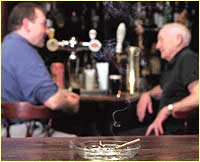| |

| |
Tuesday, May 8, 2001
Mary Ann Benitez
South China Morning Post
Nicotine levels among non-smoking restaurant workers are as high as those of smokers, new research on passive smoking has revealed.
The study, the first of its kind to be conducted in Hong Kong, is being released to coincide with the Government's drive to tighten anti-smoking laws.
The research by the Council on Smoking and Health (Cosh) is expected to back its call for the Government to ban smoking in all public places.
|
|
On Monday the Government is to release a discussion paper before Legco's health services panel outlining proposals on
strengthening the Smoking and Health Ordinance. Restaurants with more than 200 seats must make one-third of their dining
area smoke-free. Smoking in cinemas and lifts was banned in 1997 and in shopping malls, banks, department stores and supermarkets in 1998.
The Government is seeking to extend the ban to other indoor public premises, possibly including all restaurants and some other entertainment venues.
Cosh has said that since the law requiring no-smoking areas in restaurants came into effect two years ago, there have been no prosecutions.
In the United States, studies among restaurant workers found that their levels of cotinine, a metabolised form of nicotine,
were almost comparable to smokers, said Dr Abu Abdullah, director of the Smoking Cessation Health Centre of Cosh.
The cotinine levels of restaurant workers were much higher than those working outdoors, he said.
He said Cosh had done a similar study on local restaurant workers and findings which were "almost the same" as overseas
research would be released next Tuesday. The organisation has invited Dr Jim Replace, a US-based consultant on
passive smoking, to give a series of lectures next week.
Cosh chairman Professor Anthony Hedley said the Government should not get bogged down in semantics when it defines "indoor public places".
"Whether premises are indoor, outdoor or partially closed is completely irrelevant," he said. "The principle must be no worker should be
obliged to work near the lighted end of a cigarette." He said Cosh would like to see a comprehensive ban on all forms
of tobacco promotion. "The tobacco industry must be prevented from promoting tobacco, especially to youths, in any shape or
form through whatever means."
SEE ALSO
Smoke Free Bars Improve Bartenders' Respiratory Health
Bartenders Breathe Easier In Smoke-Free Bars and Taverns
When Bars Say 'No' To Smoking
Health of Bartenders Improves Rapidly When Bars Become Smoke-free
Journal of the American Medical Association Abstract - December 9, 1998
|
|
|